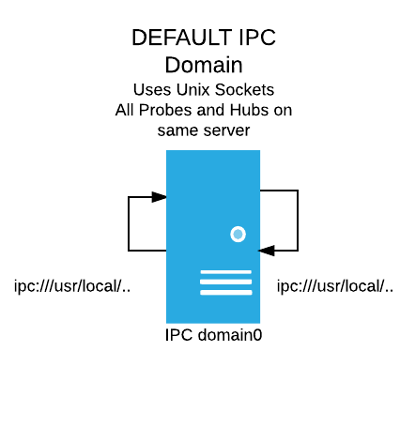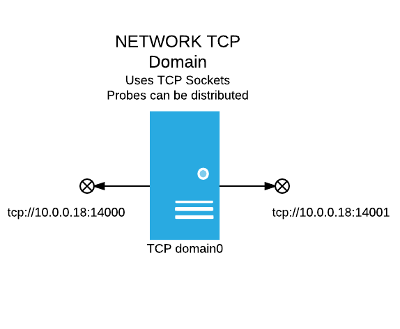Change Domain Settings
A Trisul distributed domain is identified by :
- A set of two network endpoints
- A certificate+key pair
When you first install Trisul it creates a domain0 that uses Unix Sockets as endpoints. So by default, the Trisul-Hub and Trisul-Probe will run on the same physical box. This page describes how you can generate a new Domain Certificate to modify these settings.
IPC vs TCP Domain
Trisul uses ZeroMQ (0MQ) as the underlying transport layer. As mentioned
above, the default install of Trisul uses IPC Unix Sockets for
domain0, the default domain.
In the figure below, the domain0 uses Unix Sockets identified by the 0MQ
connection strings ipc:///usr/local/var..
 |  |
|---|
Figure: The Open distributed domain that uses TCP ports 14000 and 14001 identified by the 0MQ connection strings that start with tcp://10.1.18.102:14001
domain0.cert - The Certificate File
Domain information is encoded in the Domain Certificate File that can be
found at
/usr/local/etc/trisul-hub/domain0/domain0.cert
$ cat /usr/local/etc/trisul-hub/domain0/domain0.cert
# **** Generated on 2016-07-27 20:52:08 by CZMQ ****
# ZeroMQ CURVE Public Certificate
# Exchange securely, or use a secure mechanism to verify the contents
# of this file after exchange. Store public certificates in your home
# directory, in the .curve subdirectory.
metadata
domain-id = "domain0"
domain-backend = ipc:///tmp/ctl_router_be
domain-frontend = ipc:///tmp/ctl_router_fe
domain-description = "Default Trisul Demo Domain"
curve
public-key = "?$*:Ze]{UxMgkRM[K[{FmmEc@wq:P4p)+#qT0c5d"
On the hub node there is another file called the domain0.cert_secret
representing the private key file.
Switching to a Distributed Domain
Changes to the domain settings just involve regenerating a new cert+key
pair — a new pair of files domain0.cert and domain0.cert_secret.
The following instructions tell you how to generate and install a new certificate that switches from a default IPC domain to an Open TCP domain.
Firewall would block communication between distributed nodes. To stop
firewall use systemctl stop firewalld.
Stop the Domain and All Contexts
This stops all Trisul processes on all nodes and then stops the domain0 processes.
$ sudo trisulctl_hub
stop context all
stop domain
quit
Remove the Old domain0.cert Key Pair
Remove the old certs from the share directory.
sudo rm /usr/local/share/trisul-hub/domain0.cert
sudo rm /usr/local/share/trisul-hub/domain0.cert_secret
Create a New domain0 Key Pair
Use trisulctl_hub create domain to create a new certificate+key pair
with different TCP endpoints.
You enter the following information
| Fields | Description |
|---|---|
| Domain ID | use domain0 - we’re trying to create a new cert |
| Domain Description | a text description of the domain, goes in the cert file |
| Socket 1 (frontend) | A TCP socket ; eg tcp://192.168.2.76:12001. This is in ZeroMQ format. You should enter the IP of the Hub node |
| Socket 2 (backend) | A TCP socket ; eg 12002. Use a local IP |
A run would look like this
unpl@ubuntu:~$ sudo trisulctl_hub
trisul_hub:ubuntu(domain0)> create domain
** CREATE DOMAIN **
This will create a new Trisul Network Analytics distributed domain **
Enter Domain ID (format=domain<number>) : domain0
Enter Description : Titanium products Trisul domain0
Now you will be asked to enter TWO TCP/IP Ports for use by the domain
For TCP Ports : Format is tcp://ip address:12500 ( eg : tcp://127.0.0.1:12500 )
Enter Socket 1 (frontend) : tcp://10.1.119.2:12000
Enter Socket 2 (backend) : tcp://10.1.119.2:12001
Wrote certificate and key files for domain domain0 in /usr/local/share/trisul-hub/
You may install the new domain now using 'install domain /usr/local/share/trisul-hub/domain0.cert'
trisul_hub:ubuntu(domain0)>
trisul_hub:ubuntu(domain0)>
Keep the domain0.cert certificate file in
/usr/local/share/trisul-hub. You need to share this cert with any new
probes you may deploy.
Install the New Domain Certificate
The new domain files have been placed at :
/usr/local/share/trisul-hub/domain0.cert- Cert/usr/local/share/trisul-hub/domain0.cert_secret- Private key
Next you need to install the domain certificate on all probes and hub nodes.
-
Share the
/usr/local/share/trisul-hub/domain0.certoffline with all probe nodes -
Install new domain cert on hub0
sudo trisulctl_hub install domain
/usr/local/share/trisul-hub/domain0.cert
Say YES if it asks you if you want to “Update the existing domain0 certificate”
- Install the new domain cert on each probe. The domain0.cert in this example is placed in the mycerts directory
sudo trisulctl_probe install domain /home/unpl/mycerts/domain0.cert
- Then restart domain on all nodes
sudo trisulctl_probe restart domain
sudo trisulctl_hub restart domain
Use trisulctl commands list nodes and info context to check if all
nodes have joined the new domain. All the distributed nodes must get
listed here.
Run change_endpoints for Hub Context (For First Probe Only)
RUN ON HUB ONLY FOR FIRST PROBEBy default , Trisul uses an IPC connection for each Hub node. If this is the first remote probe you are adding. You need to switch the Hub to a TCP connection mode. Follow these steps.
/usr/local/share/trisul-hub/change_endpoints
.. enter domain [default = domain0]
.. enter hub [default = hub0]
.. enter context [default = context0]
.. next enter a local Hub IP to bind to - the probes will connect to this
.. next enter a starting port number
Finishing Up
Now trisulctl_hub restart domain and trisulctl_probe restart domain
on all the hub and probe nodes respectively. Then use list nodes to
see if they have connected. Finally start context default to start
Trisul.